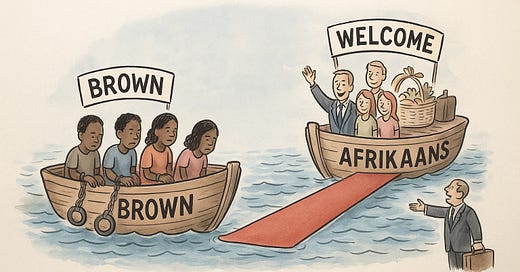Today I found myself doing that thing I sometimes do—reading the news with my head slightly tilted like a confused parrot.
Why? Because once again, I saw reports calling white South African refugees Afrikaans.
Now, hold up.
“Afrikaans” is a language, not a people. So unless we’re welcoming a bunch of talking dictionaries, something is off. And it’s not just a vocabulary slip—it’s a mirror to how racism tiptoes around in American media with a thesaurus in one hand and a dog whistle in the other.
Let me back up.
Elon Musk is technically an African-American. Born in South Africa, lives in the U.S.—it checks out. But say that out loud in a room and people will either giggle awkwardly or throw a dictionary. Why? Because in America, African-American doesn’t just mean “American from Africa”—it means Black. And that unspoken rule infects everything, especially how we talk about refugees.
When white South Africans flee the country, why are they suddenly labeled Afrikaners or Afrikaans-speaking refugees? Why not just say South Africans? We don’t call brown or Black people from Colombia “Spanish-speakers fleeing the drug war.” We say Colombian refugees. But when whiteness needs to be preserved in the sentence—it gets an ethnicity upgrade.
And let’s be honest: it’s not just word choice. It’s policy.
Brown asylum seekers from Venezuela, Haiti, and Central America get tossed out, locked up, or ghosted at the border. But white South Africans? They get invited in, with a bow of political pity and a fantasy of white persecution.
Never mind that there’s no “white genocide” in South Africa—just a complicated, painful country still healing from apartheid. But the moment a white person anywhere says “I’m in danger,” some corners of America perk up like border collies hearing a distant sheep bleat.
It’s not about who needs refuge.
It’s about who looks like they belong.
I lived in Europe long enough to know this: when someone there says “South African,” they don’t need to race-code it. But here in the U.S., we are so tangled up in color codes, even our compassion gets filtered through a shade card.
So no, not all white South Africans are Afrikaners.
And no, “Afrikaans” is not an acceptable shortcut to remind folks, “These are the good kind of refugees.”
If we can’t even say “South African” without a racial footnote, maybe the real question is this:
Why are we so desperate to sort human beings into boxes—and who benefits from keeping those boxes color-coded?
From my porch to yours—if we’re going to talk about who deserves safety, let’s make sure we’re not just offering lifeboats to those who look like us.



